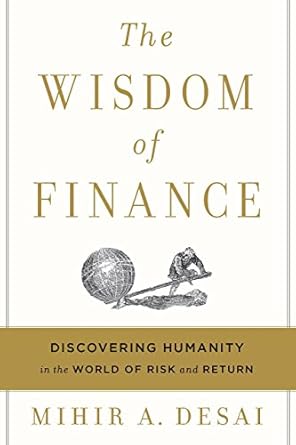More on this book
Community
Kindle Notes & Highlights
by
Mihir Desai
Read between
January 30, 2020 - April 25, 2025
life is simply not well ordered and that the role of chance is the fundamental reality we must all come to understand.
finance lost its way by promoting precision and models over human reality by trying to describe inherently social phenomena with physics and quantum mechanics.
risk management is not a goal in and of itself—but rather a set of strategies to ensure that one can take the big bets one needs to take to truly create value.
The original meaning of talent as a unit of weight (approximately 60 pounds) quickly morphed into a monetary unit associated with the value of coins corresponding to that weight. Scholars disagree about precisely how much a talent was worth, but estimates range from $1,000 to $500,000 in today’s currency.
In short, finance has a simple recipe for value creation—1) surpass the expected returns of your capital providers; 2) surpass those expectations for as long as you can; and 3) grow, so you can keep generating returns that are higher than your cost of capital. That’s all that really matters for creating value.
Wesley’s logic: “Do all the good you can. By all the means you can. In all the ways you can. In all the places you can. At all the times you can. To all the people you can. As long as ever you can.” It is difficult to summarize the financial logic of value creation any better.
The Crossroads of Should and Must.
“Should is how others want us to show up in the world — how we’re supposed to think, what we ought to say, what we should or shouldn’t do. It’s the vast array of expectations that others layer upon us.”
In this final version of the principal-agent problem, our childhood experiences end up serving as the hidden principals whom we end up serving whether we know it or not.
Frederick Crews,
Psychoanalyst Stephen Grosz’s book, The Examined Life,
While most people associate Italy with passion and romance, they overlook the fact that modern banking has its origins in medieval and Renaissance Italy, where the northern cities of Genoa, Lucca, and, most importantly, Florence witnessed the origins of what we now call a bank.
“Thomas Edison: ‘Vision without execution is hallucination’—pretty much sums up AOL/TW—failure
Aside from the many substantive benefits of leverage, which we’ll discuss shortly, using the term “leverage” allows finance people to sound much more impressive than if they simply said “borrowing other people’s money.”
enervating
“debt overhang.” The idea of debt overhang is that you can prevent yourself from doing things you should do because of the shadow of a preexisting commitment.
As we’ve seen, finance is primarily the story of risk and its omnipresence. Insurance and risk management (options and diversification) are activities we undertake to deal with risk. Costs of capital and expected returns reflect how we charge for the risks we are asked to bear. Underneath it all, however, is the notion that risk is not something that we like to bear. That’s why we undertake risk management and charge people when we bear risk. If we were indifferent to risk, much of finance would collapse. Insurance and risk management would be unnecessary and we would not charge for risk at
...more
“There are only two or three human stories, and they go on repeating themselves as fiercely as if they had never happened before, like the larks in this country, that have been singing the same five notes over for thousands of years.”


